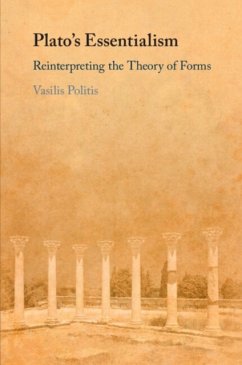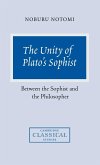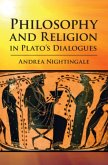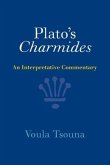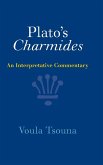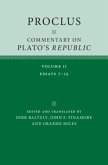- Broschiertes Buch
- Merkliste
- Auf die Merkliste
- Bewerten Bewerten
- Teilen
- Produkt teilen
- Produkterinnerung
- Produkterinnerung
In this book, Vasilis Politis argues that Plato's Forms are essences, not merely things that have an essence. Politis shows that Plato's essentialism is a well-argued, rigorous and coherent theory, and a viable competitor to Aristotelian essentialism.
Andere Kunden interessierten sich auch für
![The Cambridge Companion to Plato's Republic The Cambridge Companion to Plato's Republic]() G. R. F. Ferrari (ed.)The Cambridge Companion to Plato's Republic49,99 €
G. R. F. Ferrari (ed.)The Cambridge Companion to Plato's Republic49,99 €![The Unity of Plato's Sophist The Unity of Plato's Sophist]() Noburu Notomi (Japan Kyushu University)The Unity of Plato's Sophist146,99 €
Noburu Notomi (Japan Kyushu University)The Unity of Plato's Sophist146,99 €![Plato's Moral Realism Plato's Moral Realism]() Lloyd P. Gerson (University of Toronto)Plato's Moral Realism33,99 €
Lloyd P. Gerson (University of Toronto)Plato's Moral Realism33,99 €![Philosophy and Religion in Plato's Dialogues Philosophy and Religion in Plato's Dialogues]() Andrea Nightingale (California Stanford University)Philosophy and Religion in Plato's Dialogues44,99 €
Andrea Nightingale (California Stanford University)Philosophy and Religion in Plato's Dialogues44,99 €![Plato's Charmides Plato's Charmides]() Voula Tsouna (Santa Barbara University of California)Plato's Charmides28,99 €
Voula Tsouna (Santa Barbara University of California)Plato's Charmides28,99 €![Plato's Charmides Plato's Charmides]() Voula Tsouna (Santa Barbara University of California)Plato's Charmides95,99 €
Voula Tsouna (Santa Barbara University of California)Plato's Charmides95,99 €![Proclus: Commentary on Plato's 'Republic' Proclus: Commentary on Plato's 'Republic']() Proclus: Commentary on Plato's 'Republic'109,99 €
Proclus: Commentary on Plato's 'Republic'109,99 €-
-
-
In this book, Vasilis Politis argues that Plato's Forms are essences, not merely things that have an essence. Politis shows that Plato's essentialism is a well-argued, rigorous and coherent theory, and a viable competitor to Aristotelian essentialism.
Produktdetails
- Produktdetails
- Verlag: Cambridge University Press
- Seitenzahl: 261
- Erscheinungstermin: 24. August 2023
- Englisch
- Abmessung: 229mm x 152mm x 14mm
- Gewicht: 390g
- ISBN-13: 9781108986557
- ISBN-10: 1108986552
- Artikelnr.: 68680348
- Herstellerkennzeichnung
- Libri GmbH
- Europaallee 1
- 36244 Bad Hersfeld
- gpsr@libri.de
- Verlag: Cambridge University Press
- Seitenzahl: 261
- Erscheinungstermin: 24. August 2023
- Englisch
- Abmessung: 229mm x 152mm x 14mm
- Gewicht: 390g
- ISBN-13: 9781108986557
- ISBN-10: 1108986552
- Artikelnr.: 68680348
- Herstellerkennzeichnung
- Libri GmbH
- Europaallee 1
- 36244 Bad Hersfeld
- gpsr@libri.de
Vasilis Politis is Professor of Philosophy at Trinity College Dublin. He is author of numerous books, including The Structure of Enquiry in Plato's Early Dialogues (Cambridge, 2015) and The Aporetic Tradition in Ancient Philosophy (with George Karamanolis, Cambridge, 2018).
Introduction; 1. Why Cannot the ti esti Question Be Answered by Example and Exemplar? Hippias Major; 2. Why Cannot Essences
or Forms
be Perceived by the Senses? Hippias Major. Phaedo. Republic; 3. Why are Essences
or Forms
Unitary
Uniform and Non-Composite? Why are they Changeless? Eternal? Are they Logically Independent of Each Other? Phaedo and Republic; 4. The Relation between Knowledge and Enquiry in the Phaedo; 5. Why are Essences
or Forms
Distinct from Sense-Perceptible Things? Phaedo 74 and Republic V. 478-479; 6. Why are Essences
or Forms
the Basis of all Causation and Explanation? Phaedo 95-105; 7. What is the Role of Essences
or Forms
in Judgements about Sense-Perceptible and Physical Things? Republic VII. 523-525; 8. Why does Thinking of Things Require Essences
or Forms? Parmenides; 9. Why are Essences
or Forms
Separate from Physical Things? Also Timaeus and Philebus; 10. What Yokes Together Mind and World? Phaedo 99-100 and Republic VI. 505-509; Conclusion: Forms Simply are Essences
not Things that have Essences.
or Forms
be Perceived by the Senses? Hippias Major. Phaedo. Republic; 3. Why are Essences
or Forms
Unitary
Uniform and Non-Composite? Why are they Changeless? Eternal? Are they Logically Independent of Each Other? Phaedo and Republic; 4. The Relation between Knowledge and Enquiry in the Phaedo; 5. Why are Essences
or Forms
Distinct from Sense-Perceptible Things? Phaedo 74 and Republic V. 478-479; 6. Why are Essences
or Forms
the Basis of all Causation and Explanation? Phaedo 95-105; 7. What is the Role of Essences
or Forms
in Judgements about Sense-Perceptible and Physical Things? Republic VII. 523-525; 8. Why does Thinking of Things Require Essences
or Forms? Parmenides; 9. Why are Essences
or Forms
Separate from Physical Things? Also Timaeus and Philebus; 10. What Yokes Together Mind and World? Phaedo 99-100 and Republic VI. 505-509; Conclusion: Forms Simply are Essences
not Things that have Essences.
Introduction; 1. Why Cannot the ti esti Question Be Answered by Example and Exemplar? Hippias Major; 2. Why Cannot Essences
or Forms
be Perceived by the Senses? Hippias Major. Phaedo. Republic; 3. Why are Essences
or Forms
Unitary
Uniform and Non-Composite? Why are they Changeless? Eternal? Are they Logically Independent of Each Other? Phaedo and Republic; 4. The Relation between Knowledge and Enquiry in the Phaedo; 5. Why are Essences
or Forms
Distinct from Sense-Perceptible Things? Phaedo 74 and Republic V. 478-479; 6. Why are Essences
or Forms
the Basis of all Causation and Explanation? Phaedo 95-105; 7. What is the Role of Essences
or Forms
in Judgements about Sense-Perceptible and Physical Things? Republic VII. 523-525; 8. Why does Thinking of Things Require Essences
or Forms? Parmenides; 9. Why are Essences
or Forms
Separate from Physical Things? Also Timaeus and Philebus; 10. What Yokes Together Mind and World? Phaedo 99-100 and Republic VI. 505-509; Conclusion: Forms Simply are Essences
not Things that have Essences.
or Forms
be Perceived by the Senses? Hippias Major. Phaedo. Republic; 3. Why are Essences
or Forms
Unitary
Uniform and Non-Composite? Why are they Changeless? Eternal? Are they Logically Independent of Each Other? Phaedo and Republic; 4. The Relation between Knowledge and Enquiry in the Phaedo; 5. Why are Essences
or Forms
Distinct from Sense-Perceptible Things? Phaedo 74 and Republic V. 478-479; 6. Why are Essences
or Forms
the Basis of all Causation and Explanation? Phaedo 95-105; 7. What is the Role of Essences
or Forms
in Judgements about Sense-Perceptible and Physical Things? Republic VII. 523-525; 8. Why does Thinking of Things Require Essences
or Forms? Parmenides; 9. Why are Essences
or Forms
Separate from Physical Things? Also Timaeus and Philebus; 10. What Yokes Together Mind and World? Phaedo 99-100 and Republic VI. 505-509; Conclusion: Forms Simply are Essences
not Things that have Essences.

